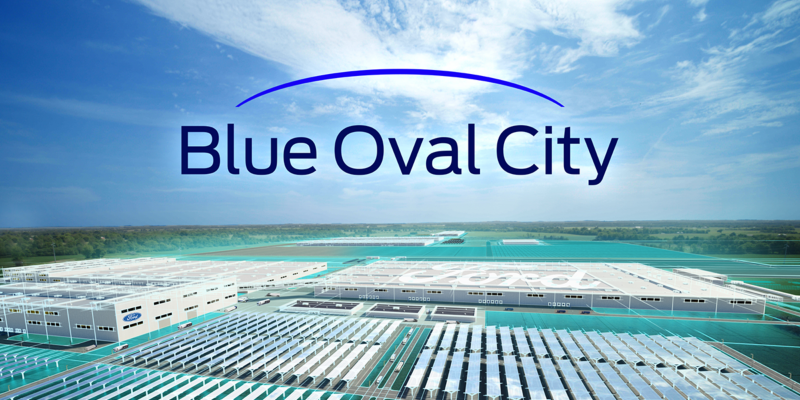Ford Electric Vehicle and Battery Factory To Transform Rural Tennessee

Two Volunteer State electric distribution cooperatives will benefit from a once-in-a-generation investment of $5.6 billion from Ford Motor Company and SK Innovation on a 3,600-acre megacampus in western Tennessee that will transform their rural communities. Chickasaw Electric Cooperative (CEC) and Southwest Tennessee Electric Membership Corporation (STEMC) have worked together for years to make the Memphis Regional Megasite attractive for development. Called Blue Oval City, the nearly six-square-mile site will bring 5,800 jobs to build next-generation electric F-Series pickups and advanced batteries.
The Tennessee Department of Economic and Community Development expects the project will generate more than 27,000 new jobs, both directly and indirectly, resulting in more than $1 billion in annual earnings and contribute $3.5 billion each year to Tennessee’s gross state product.
“Short-term, we expect more than 32,000 jobs to support construction of Ford’s new campus and more than $1.8 billion in construction-related salaries,” David Callis, executive vice president and general manager of Tennessee Electric Cooperative Association, said. “Long-term, this will change the face of that part of western Tennessee forever.”
The Megasite Sits Within CEC and STEMC Service Territories
The megasite sits within CEC and STEMC service territories, and the load will be served by the Tennessee Valley Authority.
“I got a phone call from the TVA one day and was on a plane headed to Dearborn, Michigan, the next day,” Kevin Murphy, CEO of STEMC, said. “Originally, we thought that we would serve the load, but then the estimates got so big we knew that TVA would have to serve the load directly. The load got so large that the capital investment would be too much for our other members to absorb.”
The two cooperatives have worked together, actively demonstrating the cooperative principle of cooperation among cooperatives, to find ways to serve new members that make sense for both systems.
“We’ve worked with Southwest Tennessee to examine what service is available to the megasite and surrounding areas today and what could practically be developed,” Loyd Muncy, CEC general manager and CEO, said. “We anticipate new substations on our system to support new loads and are in the fact-finding stage of examining the potential load growth. Our co-op doesn’t have any long-term debt, but that won’t be the case in the future as we add substations and build out our system to support the load growth.”
Explosive Growth Is Expected Across Residential and Commercial Members
Both cooperatives expect an explosion of residential, small and large commercial growth.
“The scope of this project is unlike anything Tennessee has ever seen and will have a lasting impact on the communities we serve and all of West Tennessee,” Murphy said. “A new substation and distribution plant are going to create a lot of capital needs, and we’re going to need to take on some debt. It pays to have a good banking partner, like CFC.”
The statewide and distribution cooperatives expect the rate of electric vehicle (EV) adoption to increase as F-Series pickups roll off the assembly line.
“It’s a point of pride for plant employees to drive the vehicle they helped build,” Callis said. “I expect in 20 years, when you talk about your EV, you’re just going to talk about your vehicle, because it’s going to be normal or expected that your vehicle is electric.”
Co-ops Work To Prepare for EVs
To address the future growth of EVs on its system, CEC is considering whether to develop a time-of-use rate or special pricing to keep EV charging off the system’s peak and avoiding high demand charges on its wholesale power bill.
STEMC already had plans to install charging stations along interstates and major roadways in the future, but it now expects to accelerate those plans when members adopt EVs in greater numbers.
The Tennessee legislature approved an $884 million spending package in October to clear the way for the largest, most advanced and most efficient automotive production campus in Ford and the nation’s history. The package includes $500 million in incentives for Ford and $384 million to cover infrastructure projects, workforce development and other costs. The campus will include an assembly plant, supplier park and a battery manufacturing plant.
“This single-largest investment in state history marks a tremendous win for rural Tennessee and will strengthen our workforce for generations,” Tennessee Governor Bill Lee said in a statement.
The state will build a new Tennessee College of Applied Technology on the megasite in partnership with Ford and SK Innovation to provide customized training with a focus on EV and battery manufacturing and repair with a concentration on mechatronics engineering and auto mechanics.
“In my 30-plus years in the business, this is a perfect example of concern for community—not just keeping the lights on—but investing in the community,” Callis said. “Rural residents will have a place to work and a place where kids and grandkids can have a great quality of life.”